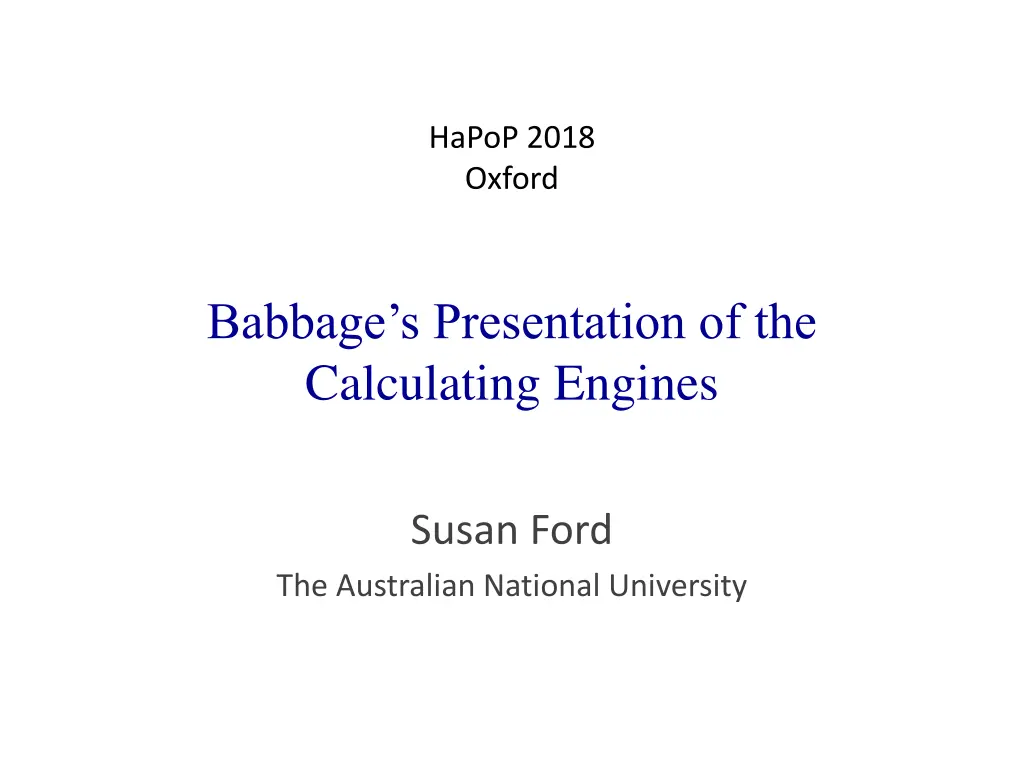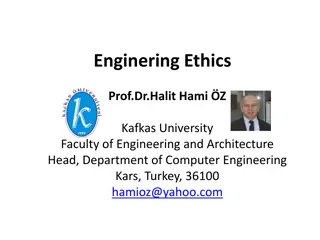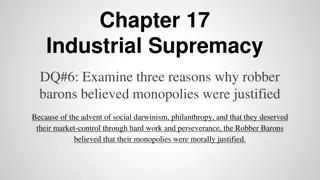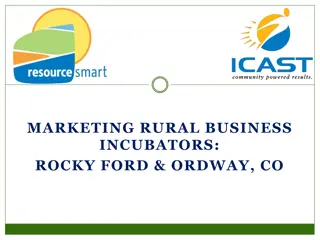
Babbage's Legacy: An Overview of the Calculating Engines and His Influence
Explore the legacy of Charles Babbage and his calculating engines, from his visionary ideas to their impact on modern computing. Learn about his publications, the Ninth Bridgewater Treatise, technological displays, and the Exposition of 1851. Discover how Babbage's work laid the foundation for future advancements in the field of computing.
Uploaded on | 0 Views
Download Presentation

Please find below an Image/Link to download the presentation.
The content on the website is provided AS IS for your information and personal use only. It may not be sold, licensed, or shared on other websites without obtaining consent from the author. If you encounter any issues during the download, it is possible that the publisher has removed the file from their server.
You are allowed to download the files provided on this website for personal or commercial use, subject to the condition that they are used lawfully. All files are the property of their respective owners.
The content on the website is provided AS IS for your information and personal use only. It may not be sold, licensed, or shared on other websites without obtaining consent from the author.
E N D
Presentation Transcript
HaPoP 2018 Oxford Babbage s Presentation of the Calculating Engines Susan Ford The Australian National University
In writing of Babbage as a computer pioneer one must at once admit that his work, however brilliant and original, was without influence on the modern development of computers. The principles that Babbage elucidated but regrettably failed to communicate, had to be rediscovered by the men who, 100 years later, built the first automatic computers. (emphasis added) (Maurice Wilkes, Babbage as a computer pioneer 1977)
Babbages operations in effect a version of Churchs thesis Babbage s ideas were known of ( not forgotten ) its theoretical importance its importance, so to speak, as software was little recognized pre WW II work placed the emphasis on a fixed iterable sequence of arithmetical operations. The fundamental importance of conditional iteration and conditional transfer for a general theory of calculating machines is not recognized (Robin Gandy, Confluence of ideas in 1936 (1988)
Babbages publications in order (excluding mathematics papers): 1826 article on the mechanical notation (16 pages in Phil Trans) 1826 Assurance of Lives 1831 Decline of Science 1834 Babbage s calculating Engine (65-page article in Edinburgh Review by Dionysius Lardner) 1835 Economy of Machinery and Manufactures 1837 Ninth Bridgewater Treatise 1851 Exposition of 1851 1864 Passages from the Life of a Philosopher
A Godly argument The Ninth Bridgewater Treatise (1837) the mechanism brought into action for the purpose of changing the nature of the calculation from the production of the merest elementary operations into those highly complicated ones of which we speak, is itself of the simplest kind.
Engaging the Public ~ Exposing the Engines 1851 Great Exhibition in the Crystal Palace, London - displays the works of industry of all nations - Difference Engine model version refused as exhibit - Babbage responds by publishing a polemic The Exposition of 1851
The Exposition of 1851 long essay on the state of science, of manufacturing, the objects of commercial competition, pricing, quality assurance Preface: Engand has invited the civilized world to meet in its great commercial centre; asking it, in friendly rivalry, to display for the common advantage of all, those objects which each country derives from the gifts of nature, and on which it confers additional utility by processes of industrial art.
it is possible for him who is a perfect master of his own craft, so to explain them (sc. the processes of manufacture] without technical terms, as in the language of commonsense, that most persons of tolerably liberal education, and possessing a fair average intellect, may not only understand the effect produced, but admire the ingenuity by which it was attained. (Exposition, p131, 1851)
Babbage tries to invent a universal natural language only discontinued his investigations in this direction, on account of the enormous labour which the undertaking would inevitably demand . . . he was far from regarding the accomplishment of the object as visionary, and belived that the advanced state of mental analysis at the present day, promised a successful result to any investigator who might happily combine the taste, time, and talent, for such a pursuit (Buxton, Memoir, 347)
Babbage with scientists in Italy 1840s: around the room were hung the formula [sic], the drawings, notations and other illustrations (Passages, p130)
Conclusions belief in (almost) universal knowedge belief in expertise writes from first principles assumes universal wish to know












